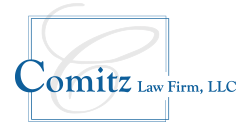 Estate planning is a complex process that can lend itself to numerous mistakes if not established by a knowledgeable professional. The top mistake? Not having an estate plan. While most adults can benefit from an estate plan, only 33% of Americans have such a plan. The biggest reason for the low percentage is “just not getting around to it”. Some people believe that if they have a will, an estate plan is not necessary. Attorney Jonathan Comitz of Comitz Law notes that “a will is just one of the documents included in a well-prepared estate plan”.
Estate planning is a complex process that can lend itself to numerous mistakes if not established by a knowledgeable professional. The top mistake? Not having an estate plan. While most adults can benefit from an estate plan, only 33% of Americans have such a plan. The biggest reason for the low percentage is “just not getting around to it”. Some people believe that if they have a will, an estate plan is not necessary. Attorney Jonathan Comitz of Comitz Law notes that “a will is just one of the documents included in a well-prepared estate plan”.
Some common estate planning mistakes include, but certainly are not limited to:
Doing your own estate plan
A person might be tempted do his or her own estate plan. Online cookie-cutter, fill in the blanks, do-it-yourself online forms purport to make the process simple. However, the final product cannot be as individualized as a financial plan created through personal interaction with a knowledgeable attorney.
Failing to update your estate plan
Life circumstances change drastically over time. Your estate plan should reflect these changes. It is important to review your estate plan on a regular basis, and make revisions for significant events such as marriage, divorce, the birth/adoption of a child, the death of a loved one, and changes in joint account holders or beneficiaries.
Not naming contingent beneficiaries
If a beneficiary of a trust or will passes away, the estate plan will have to be revised. If the will includes alternate beneficiaries, then the alternate receives the inheritances. In the event that the will does not name an alternate, or the alternate has also passed away, the result will be a “lapsed” or “failed” gift.
Failing to plan for children with special needs
If a child with special needs is not planned for properly, the child risks being disqualified from receiving Social Security benefits. In that event, the child’s care would have to be funded by other means.
Not planning for disability
Approximately one-third of all people ages 35 – 65 will suffer a disability for at least 90 days. One in seven workers will be disabled for five years or more sometime before they reach retirement age.
Not planning for incapacity
Once you are incapacitated, you can no longer legally assign someone else to act on your behalf. The failure to address the situation can have serious consequences.
Not planning for long term care
Seventy-percent of people age 65 will need long-term care before the end of their life. A private room in a nursing home can cost more than $125,000 a year.
Putting your child’s name on the deed to your home
Once you sign a deed transferring title of your property to your child, you are no longer the owner. Loss of ownership means total loss of control of the property.
Not specifying a guardian for children
If you pass away without a will that designates a guardian for your minor children, the other parent will typically get custody. If the other parent also passes away or is unable to care for your child, the courts will decide who the guardian will be.
Not providing guidelines for guardians
Every person has different ideas on how to manage the finances of a dependent. So, unless you are in complete agreement with the approach of your guardian designee, providing guidance is prudent.
Failure to fund the trust
This failure may result in your assets having to go through a costly probate proceeding. Alternately, it can lead to your assets being distributed to unintended recipients.
Failing to create powers of attorney
A power of attorney (POA) is legal authorization for a designated person to make decisions on another person’s behalf. Medical powers of attorney are included in estate plans to guide medical decisions. Financial powers of attorney guide property and legal decisions.
Appointing irresponsible people to trusted positions
These people are typically given considerable power over your property and finances. It is critical to avoid putting an untrustworthy person in a fiduciary position.
Not hiring an experienced estate planning attorney
Without sufficient experience, an attorney can’t be expected to know the nuances of the relevant law. Nor can that attorney elicit the information needed to best serve the client’s estate planning needs. At Comitz Law, we have the experience to help you create an estate plan that will best suit your needs.
To speak with an experienced estate planning attorney, call Comitz Law at 570-829-1111 or email info@comitzlaw.com.


